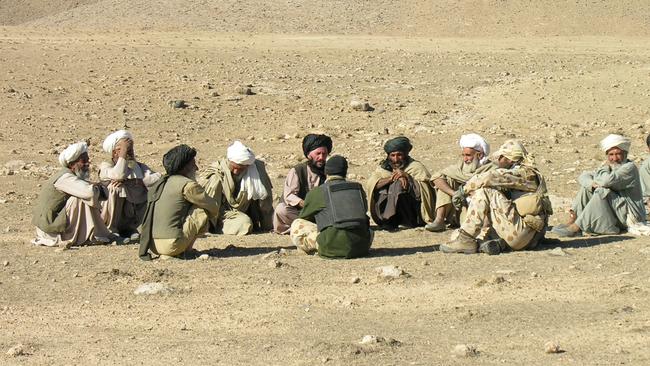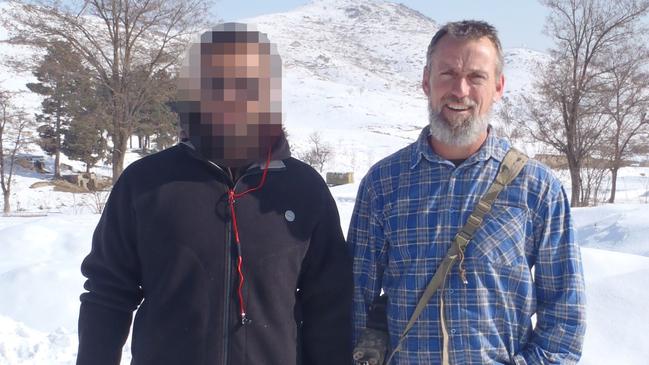Australia owes Afghani interpreters for their combat bravery
SAS team commander Harry Moffitt, who deployed to Afghanistan seven times, says it’s time for Australia to repay interpreters for their courage under fire

From my first mission in 2002, mostly spent on foot on the Afghan/Pakistan border regions hunting Osama bin Laden, the interpreters were there with us.
Side by side and always armed only with their body armour, a bottle of water, and a smile.
Right through to working on the streets of Kabul, a city I grew to know better than Melbourne, our interpreters were critical on a daily and hourly basis. They not only assisted us in translating the nuance of up to four or five different dialects, gaining intelligence, and at times providing close protection, they became our friends.
From 2001 through to 2012, I completed 11 operational deployments as part of the Special Air Service Regiment, and Australian Defence Force. Of those, seven were to Afghanistan.
I am in regular contact with our interpreter friends both here and overseas. I consider them not only lifelong friends but brothers in arms in many cases.
Many were foreign nationals, who were recruited from the US or Australia; however, many more were Afghani nationals and locals, who returned to their villages and towns either daily or on regular leave to see their families.
The perilous nature of these interpreters’ existence is obvious, as is that of their families.
Many worked in diplomatic roles and from the relative safety of HQs, far behind the lines. But many more served in the front lines, on the battlefield.
Likely missed by the layperson watching footage of combat in Afghanistan on nightly TV, I regularly see the interpreters scrambling for cover in the background, as the gun fight erupts around them.

Unarmed, I can see them picking their way around the battlefield with relative calm, anticipating where they will next best be used. Many of our interpreters have seen more combat time on operations, in acquitting our national mission, than the majority of our Defence Force and, dare I say, many of our SAS operators.
Many have paid the ultimate price — beheaded and left on the sides of the remote tracks of the dasht. In one incident I experienced, having just been wounded in an improvised explosive device ambush, I found myself sobbing while holding the hands of our interpreter “Sammy” who had lost his legs in the explosion. These were not isolated incidents.
However, many of our former interpreters are certainly isolated in their homeland.
With an increasingly united and emboldened Taliban-al-Qaida regaining control in the Graveyard of Empires, the situation for our interpreter friends is increasingly dire and urgent.
Recent stories of death notices posted on front doors of Afghan interpreters’ houses are real. Our intelligence briefs regularly cited interpreters as of the highest interest to the enemy forces and an unimaginable fate would await any interpreter caught by them.
As the TB-AQ alliance continues to grow in Afghanistan, so does this serious threat to the safety of our comrades and their families.
This is to say nothing of the apparent rise of ISIS across the region highlighting that as coalition forces leave and local care and diplomatic agencies harden their compounds and local engagement, there will be nowhere for these friends to hide.
Certainly, the closure of the Australian Embassy in Kabul, and the apparent loss of somewhere to make their resettlement claims, will raise anxieties in the interpreter community both there and in Australia.
It was therefore of great comfort to hear the announcement from Defence Minister Peter Dutton that Afghan interpreters will be given “the highest visas processing priority” in resettlement application. They deserve nothing less.
I, like all of our ADF soldiers, sailors, airmen and women, remain ready to go anywhere, anytime to protect the most vulnerable people against the most despicable. And we do so knowing full well that we have great support behind us and ultimately can return to one of the luckiest countries in history.
I think this privilege should be immediately extended to those who have stood beside us in those most dangerous of circumstances, circumstances many of them continue to endure. Our Afghan interpreters, and their families, have acquitted themselves with excellence. I have no doubt they will continue to do so here where they can be appropriately recognised for their service.
Harry Moffitt is a former SAS team commander, now psychologist and author of Eleven Bats.


